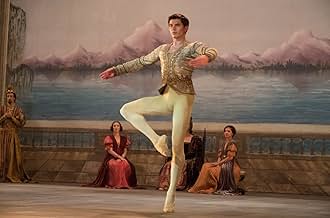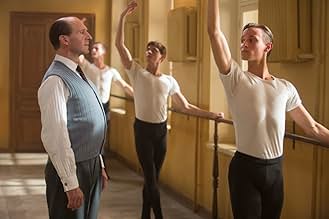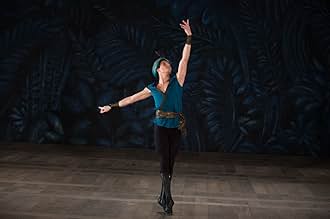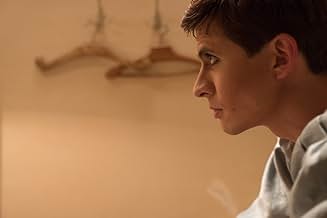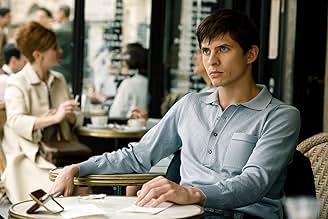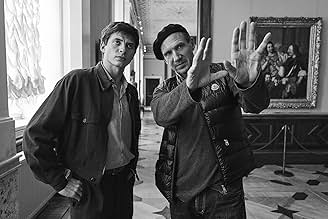PUNTUACIÓN EN IMDb
6,6/10
7,3 mil
TU PUNTUACIÓN
La historia de cómo el bailarín Rudolf Nureyev desertó de la Unión Soviética por Occidente.La historia de cómo el bailarín Rudolf Nureyev desertó de la Unión Soviética por Occidente.La historia de cómo el bailarín Rudolf Nureyev desertó de la Unión Soviética por Occidente.
- Dirección
- Guión
- Reparto principal
- Premios
- 1 premio y 4 nominaciones en total
Reseñas destacadas
The film's title derives from the Russian phrase "belaya vorona", or "white crow", meaning an outsider or nonconformist, a person who stands out from his or her contemporaries in the way that a white crow would stand out from its black fellows. The "white crow" of this film is the Russian ballet dancer Rudolf Nureyev, a man who had difficulty conforming to the official Soviet system, either in his artistic life or in his personal life. (He was gay at a time when this was neither lawful nor acceptable in Soviet society).
Nureyev shocked the world of ballet when he defected to the West at Le Bourget airport, Paris, in 1961, and the film is built around this incident. His decision to defect was, apparently, a spontaneous one, taken when the Communist authorities, irritated by the fact that he had spent much of his time in Paris in the company of Western intellectuals and concerned by rumours that he had been seen in a gay bar, decided to send him back to Russia rather than allowing him to travel with the Kirov ballet to London, the next leg of their tour. Scenes of Nureyev's stay in Paris are intercut with flashbacks to his poverty-stricken wartime childhood in the provincial city of Ufa and to his time as a ballet student in Leningrad, as St Petersburg was then known.
The film was directed by the well-known British actor Ralph Fiennes, clearly a ballet enthusiast. Fiennes also takes an acting role as Alexander Pushkin- not, of course, the classic Russian author but Nureyev's tutor at the Kirov Ballet. This was, I felt, one of two outstanding performances in the film. Pushkin emerges not only as a visionary who spotted Nureyev's talent when many did not but also as a sympathetic father-figure who provided the young dancer with a kindness and understanding that was otherwise lacking in the rigid, inflexible Soviet system. The other great performance, of course, comes from the young Oleg Ivenko as the conflicted Nureyev himself. On the one hand he is held by a love of his Russian homeland, the land which contains all he knows and all that he has held dear- his family, his friends and his mentor Pushkin. On the other hand, he is drawn towards the West, not only because of the greater intellectual freedom which it offers but also because of a feeling that it is only there that he can fully realise himself as a dancer.
I must admit that I am not a great balletomane myself; I have been to the ballet on only a handful of occasions in my life, and never saw Nureyev dance except on television. Yet there are some films which have been good enough able to hold my attention even though they are centred upon activities in which I would normally take little interest. Like most Britons, I know little about baseball, yet I was enthralled by "Eight Men Out" and "Field of Dreams". I probably know even less about wrestling, but that did not prevent me from admiring the more recent "Foxcatcher". "White Crow" comes into the same category. Those who love ballet will doubtless be enthralled by it. Even those of us who do not will be able to see enough in this movie to understand the enthusiasm of those who do. And both groups will join together in their appreciation of the human drama which lies at the heart of Rudolf Nureyev's story. 8/10
Nureyev shocked the world of ballet when he defected to the West at Le Bourget airport, Paris, in 1961, and the film is built around this incident. His decision to defect was, apparently, a spontaneous one, taken when the Communist authorities, irritated by the fact that he had spent much of his time in Paris in the company of Western intellectuals and concerned by rumours that he had been seen in a gay bar, decided to send him back to Russia rather than allowing him to travel with the Kirov ballet to London, the next leg of their tour. Scenes of Nureyev's stay in Paris are intercut with flashbacks to his poverty-stricken wartime childhood in the provincial city of Ufa and to his time as a ballet student in Leningrad, as St Petersburg was then known.
The film was directed by the well-known British actor Ralph Fiennes, clearly a ballet enthusiast. Fiennes also takes an acting role as Alexander Pushkin- not, of course, the classic Russian author but Nureyev's tutor at the Kirov Ballet. This was, I felt, one of two outstanding performances in the film. Pushkin emerges not only as a visionary who spotted Nureyev's talent when many did not but also as a sympathetic father-figure who provided the young dancer with a kindness and understanding that was otherwise lacking in the rigid, inflexible Soviet system. The other great performance, of course, comes from the young Oleg Ivenko as the conflicted Nureyev himself. On the one hand he is held by a love of his Russian homeland, the land which contains all he knows and all that he has held dear- his family, his friends and his mentor Pushkin. On the other hand, he is drawn towards the West, not only because of the greater intellectual freedom which it offers but also because of a feeling that it is only there that he can fully realise himself as a dancer.
I must admit that I am not a great balletomane myself; I have been to the ballet on only a handful of occasions in my life, and never saw Nureyev dance except on television. Yet there are some films which have been good enough able to hold my attention even though they are centred upon activities in which I would normally take little interest. Like most Britons, I know little about baseball, yet I was enthralled by "Eight Men Out" and "Field of Dreams". I probably know even less about wrestling, but that did not prevent me from admiring the more recent "Foxcatcher". "White Crow" comes into the same category. Those who love ballet will doubtless be enthralled by it. Even those of us who do not will be able to see enough in this movie to understand the enthusiasm of those who do. And both groups will join together in their appreciation of the human drama which lies at the heart of Rudolf Nureyev's story. 8/10
My wife and I watched this at home on DVD from our public library.
While the focus of this movie is the 1961 defection of ballet dancer Nureyev you can't really tell that part of his life without understanding his beginnings, from being born on a train in 1938 to studying under the demanding Soviet system. Most of that takes up the first half of the movie.
I remember Nureyev well, he was such an inventive dancer and became popular world-wide in the 1960s and 1970s but I never knew his story. When the company of dancers would tour outside the USSR they were not supposed to exchange ideas or even talk to people from other countries but Nureyev never really followed the rules. When it looked like going back home might be bad for him, in France he defected, asking for political asylum. The scenes that retell and dramatize the incident are some of the best in this movie.
For the role Oleg Ivenko, a Ukranian who really is a ballet dancer in Russia and a first-time actor, plays Rudolf Nureyev and he plays him very well.
A really well made movie and a well told story, we enjoyed it.
While the focus of this movie is the 1961 defection of ballet dancer Nureyev you can't really tell that part of his life without understanding his beginnings, from being born on a train in 1938 to studying under the demanding Soviet system. Most of that takes up the first half of the movie.
I remember Nureyev well, he was such an inventive dancer and became popular world-wide in the 1960s and 1970s but I never knew his story. When the company of dancers would tour outside the USSR they were not supposed to exchange ideas or even talk to people from other countries but Nureyev never really followed the rules. When it looked like going back home might be bad for him, in France he defected, asking for political asylum. The scenes that retell and dramatize the incident are some of the best in this movie.
For the role Oleg Ivenko, a Ukranian who really is a ballet dancer in Russia and a first-time actor, plays Rudolf Nureyev and he plays him very well.
A really well made movie and a well told story, we enjoyed it.
This film tells the story of a Russian ballet dancer who defected in France during the cold war.
I can't quite believe how good this film is. The story is intense and captivating, even if you don't know about Rudi or about ballet. The dances portrayed are beautiful, the leading actors are great to look at too. The airport scene is so intense that I watched it several times. I also particularly like the fact that Clara Sant helped Rudi so much, without expecting anything in return. I enjoyed every bit of this film, and I strongly recommend it.
I can't quite believe how good this film is. The story is intense and captivating, even if you don't know about Rudi or about ballet. The dances portrayed are beautiful, the leading actors are great to look at too. The airport scene is so intense that I watched it several times. I also particularly like the fact that Clara Sant helped Rudi so much, without expecting anything in return. I enjoyed every bit of this film, and I strongly recommend it.
Based on the life of Rudolf Nureyev (portrayed by Oleg Ivenko): in different time segments, the life of the ballet great is depicted during his childhood in rural Eastern Russia; his late teen years training in Leningrad (now St. Petersburg); and the Kirov Ballet tour in Paris of 1961 during which Nureyev made a decision that changed his life significantly. The film is based on the novel "Rudolf Nureyev: A Life" by Julie Kavanaugh and is a British/French/Serbian co-production spoken in Russian, French, and English.
One of the enjoyable aspects of the film is following the young man's transition from a rural area into cities as grand as Leningrad and Paris and his awestruck fascination with the visual arts at his disposal. This can easily remind many viewers of their first travel experiences and having felt the same elation.
The three different time sequences are done concurrently which is sometimes jarring and unnecessary. The film would probably have been better if done chronologically with only occasional flashbacks.
Around the halfway mark of the film, Nureyev is showing a lot of irritability in a restaurant scene. It is at this mark that the viewer could feel equally irritated after having had enough of the frequent timeline changes and the film's reduced energy by that point. Also in that scene, while Nureyev is showing a strong reaction to class prejudice from other Russians, there was little to indicate this problem in earlier scenes. His rudeness seems to come out of nowhere.
Despite these criticisms, it is all worth it for the extended climactic scene at Paris' Le Bourget Airport (very well re-constructed to resemble its appearance in the early 1960s). Much like the final airport scene in "Argo", the one here has suspense, tension, and mystery even if the outcome is already well known.
"The White Crow" is a fine tribute to an artistic icon and a good depiction of the life of a genius in a restrictive, Communist country although it would have benefited to explore more on another restriction in Rudolf's life under Communisim - his homosexuality. Considering the film concluded when its subject was still very young, it is tempting to encourage a sequel for the remainder of such a very unique life of an extremely rare individual who radically changed fate for his own life and that of the ballet world. - dbamateurcritic
One of the enjoyable aspects of the film is following the young man's transition from a rural area into cities as grand as Leningrad and Paris and his awestruck fascination with the visual arts at his disposal. This can easily remind many viewers of their first travel experiences and having felt the same elation.
The three different time sequences are done concurrently which is sometimes jarring and unnecessary. The film would probably have been better if done chronologically with only occasional flashbacks.
Around the halfway mark of the film, Nureyev is showing a lot of irritability in a restaurant scene. It is at this mark that the viewer could feel equally irritated after having had enough of the frequent timeline changes and the film's reduced energy by that point. Also in that scene, while Nureyev is showing a strong reaction to class prejudice from other Russians, there was little to indicate this problem in earlier scenes. His rudeness seems to come out of nowhere.
Despite these criticisms, it is all worth it for the extended climactic scene at Paris' Le Bourget Airport (very well re-constructed to resemble its appearance in the early 1960s). Much like the final airport scene in "Argo", the one here has suspense, tension, and mystery even if the outcome is already well known.
"The White Crow" is a fine tribute to an artistic icon and a good depiction of the life of a genius in a restrictive, Communist country although it would have benefited to explore more on another restriction in Rudolf's life under Communisim - his homosexuality. Considering the film concluded when its subject was still very young, it is tempting to encourage a sequel for the remainder of such a very unique life of an extremely rare individual who radically changed fate for his own life and that of the ballet world. - dbamateurcritic
A beautiful film. But not so convincing. Correct but easy to reduce it to the last part tension. Interesting portrait of the period, expression of admiration for Nureev art, seductive ballet scenes and the hard try to convince. But, in too many parts, the film remains only a sketch. The good points - hard effort of Oleg Ivanko to create his role and to convince the viewer, the passion of Ralph Fiennes to the project, the presence of Sergei Polunin and the performance of Adele Exarchopoulos. The result is, obvious, a beautiful one . But convince it ? In few points, with indulgence in other.
¿Sabías que...?
- CuriosidadesHayden Christensen, who trained extensively in ballet as a child, was first choice to star; however a persistent ankle injury prevented him from being able to perform to the standards demanded by Ralph Fiennes.
- PifiasIn a scene showing a close up of Nureyev's foot performing a tendu, the shoe he is wearing is a white split sole ballet slipper, a shoe that did not exist in the 1960s. Split sole ballet technique shoes have only been on the dance scene since the mid 1990s.
- Citas
Claire Motte: You are with the company? Did you dance tonight?
Rudolf Nureyev: If I had danced, you would remember.
- ConexionesFeatured in Ralph Fiennes & Oleg Ivenko in Conversation (2019)
- Banda sonoraLa Bayadère 3rd Shade Variation
Composed by Ludwig Minkus
Arranged by Matthias Gohl
Performed by Ilan Eshkeri and The London Metropolitan Orchestra
Selecciones populares
Inicia sesión para calificar y añadir a tu lista para recibir recomendaciones personalizadas
- How long is The White Crow?Con tecnología de Alexa
Detalles
Taquilla
- Recaudación en Estados Unidos y Canadá
- 1.828.784 US$
- Fin de semana de estreno en EE. UU. y Canadá
- 78.782 US$
- 28 abr 2019
- Recaudación en todo el mundo
- 7.622.595 US$
- Duración2 horas 7 minutos
- Color
- Relación de aspecto
- 1.85 : 1
Contribuir a esta página
Sugerir un cambio o añadir el contenido que falta






